五年级下册英语素材-全册知识点总结 广州版(一起)
五年级下册英语素材全册知识点总结 广州版
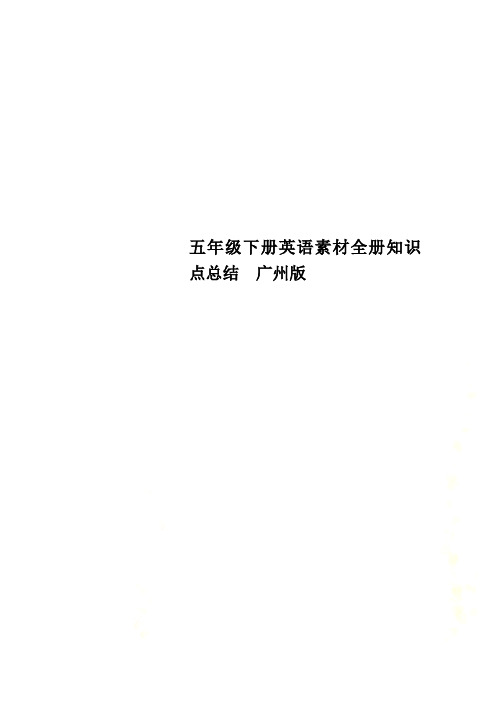
五年级下册英语素材全册知识点总结广州版五年级下册知识点Module 1 Our Life一、学习重点1)能就“自己的日常生活”的话题进行交谈;2)能就“比较”的话题进行交谈;3)能用电话用语进行交流。
1、复习时态,特别要掌握好一般现在时第三人称作主语的特殊疑问句:1) How does he/she go to school. 2) What time does he/she get up?3) Where does he/she study? 4) Whose former pupil lives in Leeds?5) Which school does she study at? 6) Who studies at Rose School?2、初步体验形容词比较级的句型:1) He is/looks thinner now than before. 2) Is he taller than me?3) Does he look taller than me? 4) He isn’t stronger than me.3、情态动词should、could、may的用法及一些交际用语:1) He should get up early. 2) She shouldn’t play computer game too much.3) Could you help me? I’d be glad/love to. 4) May I sit speak to Jane?5、电话用语:-- May I speak to Mr Li? -- This is Ben speaking.May / Could / Can I speak to …This is …speaking. / Speaking. Who’s this / that?注意问题1、总结主语是第三人称单数时, 一般现在时的肯定句,否定句和一般疑问句的变化, 例如:I eat dinner at six. He eats dinner at six too. I don’t eat dinner at six.He doesn’t eat dinner at six either. Do you eat dinner at six? Does he eat dinner at six?2、总结主语是第三人称单数时, 一般现在时的特殊疑问句形式, 如:sleep v. 睡觉He is sleeping on his mother’s bed. 他睡在他妈妈的床上。
(广东英语版开心英语gogo)五年级下册知识点汇总
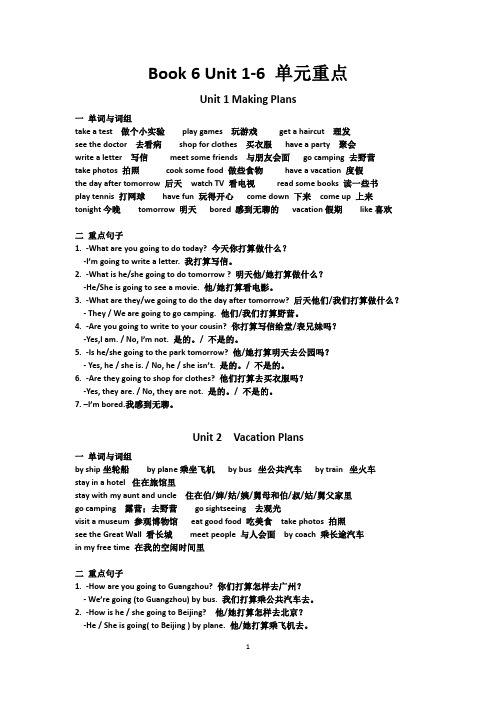
Book6Unit1-6单元重点Unit1Making Plans一单词与词组take a test做个小实验play games玩游戏get a haircut理发see the doctor去看病shop for clothes买衣服have a party聚会write a letter写信meet some friends与朋友会面go camping去野营take photos拍照cook some food做些食物have a vacation度假the day after tomorrow后天watch TV看电视read some books读一些书play tennis打网球have fun玩得开心come down下来come up上来tonight今晚tomorrow明天bored感到无聊的vacation假期like喜欢二重点句子1.-What are you going to do today?今天你打算做什么?-I’m going to write a letter.我打算写信。
2.-What is he/she going to do tomorrow?明天他/她打算做什么?-He/She is going to see a movie.他/她打算看电影。
3.-What are they/we going to do the day after tomorrow?后天他们/我们打算做什么?-They/We are going to go camping.他们/我们打算野营。
4.-Are you going to write to your cousin?你打算写信给堂/表兄妹吗?-Yes,I am./No,I’m not.是的。
/不是的。
5.-Is he/she going to the park tomorrow?他/她打算明天去公园吗?-Yes,he/she is./No,he/she isn’t.是的。
广州版小学英语五年级下每单元要点。
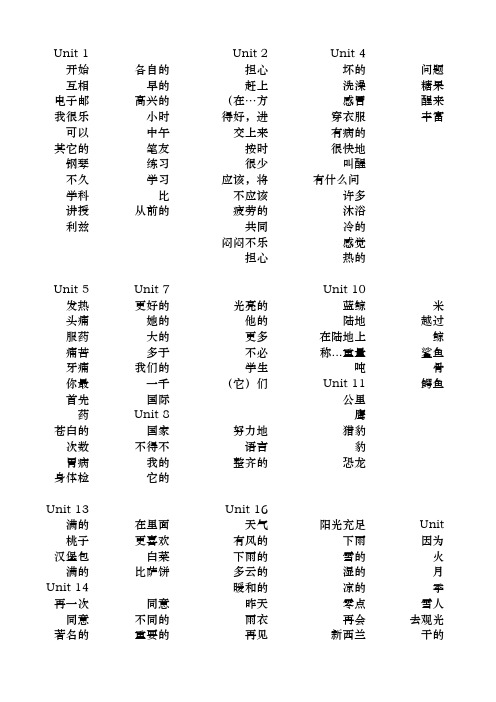
Unit 1Unit 2 Unit 4开始各自的担心坏的问题互相早的赶上洗澡糖果电子邮件高兴的(在…方面)做感冒醒来我很乐意小时得好,进展好穿衣服丰富可以中午交上来有病的其它的笔友按时很快地钢琴练习很少叫醒不久学习应该,将要有什么问题吗学科比不应该许多讲授从前的疲劳的沐浴利兹共同冷的闷闷不乐的感觉担心热的Unit 5 Unit 7 Unit 10发热更好的光亮的蓝鲸米头痛她的他的陆地越过服药大的更多在陆地上鲸痛苦多于不必称...重量鲨鱼牙痛我们的学生吨骨你最好.... 一千 (它)们Unit 11 鳄鱼首先 国际的公里药Unit 8 鹰苍白的国家努力地猎豹次数不得不语言豹胃病我的整齐的恐龙身体检查它的Unit 13 Unit 16满的在里面天气阳光充足的Unit 17 桃子更喜欢有风的下雨因为汉堡包白菜下雨的雪的火满的比萨饼多云的湿的月Unit 14 暖和的凉的季再一次同意昨天零点雪人 (复数)同意不同的雨衣再会去观光著名的重要的 菜单再见新西兰干的种类餐馆穿上滑雪持续猪肉海产食物听起来有雾的地方将;会谷类度伞雪人奇怪王后温度观光果菜类西方的白雪公主同意Unit 1.Unit 2晚饭后很多家庭作业在学校擅长于……在学校食堂迟到乘校车担心……乘地铁赶上……做某人的作业在…方面做得好互相发邮件喜欢做某事一小时睡觉以前的学生按时交作业早起看起来很累半小时打电脑游戏吃午饭在课堂上睡觉互相帮助对……说话帮某人做某事做运动像你一样太多需要做某事在卧室里工作别的科目笔友弹钢琴练习做某事练习弹钢琴学中文漂亮的女孩想要做某事Unit 4 Unit 5 .短语吃早餐晚饭后觉得病了放学后觉得累很多感觉舒服大量的蔬菜穿衣服在学校起床觉得饿/累/冷/热回去睡觉很长时间洗澡给某人进行一次体检感冒早睡发烧交某人的作业头痛有许多作业牙痛疼痛胃疼多少水果许多水果看起来很苍白许多蔬菜按时看医生留在家待在床上吃药休息一天三次很晚步行去学校Unit 7 Unit 81080八点差一刻乘巴士去上学来自……更美丽工作努力的搬到有更难的工作要做大得多不得不离你家更近我认为是这样。
广州五年级下英语知识点
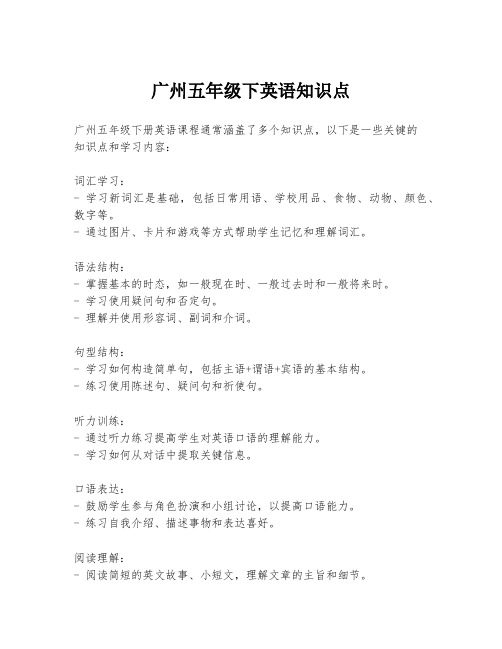
广州五年级下英语知识点广州五年级下册英语课程通常涵盖了多个知识点,以下是一些关键的知识点和学习内容:词汇学习:- 学习新词汇是基础,包括日常用语、学校用品、食物、动物、颜色、数字等。
- 通过图片、卡片和游戏等方式帮助学生记忆和理解词汇。
语法结构:- 掌握基本的时态,如一般现在时、一般过去时和一般将来时。
- 学习使用疑问句和否定句。
- 理解并使用形容词、副词和介词。
句型结构:- 学习如何构造简单句,包括主语+谓语+宾语的基本结构。
- 练习使用陈述句、疑问句和祈使句。
听力训练:- 通过听力练习提高学生对英语口语的理解能力。
- 学习如何从对话中提取关键信息。
口语表达:- 鼓励学生参与角色扮演和小组讨论,以提高口语能力。
- 练习自我介绍、描述事物和表达喜好。
阅读理解:- 阅读简短的英文故事、小短文,理解文章的主旨和细节。
- 学习如何通过上下文猜测生词的意思。
写作技巧:- 练习写简单的句子和段落,如日记、书信和故事。
- 学习如何组织思想和使用连接词。
文化知识:- 了解英语国家的文化习俗和节日,如圣诞节、复活节等。
- 学习一些简单的英语歌曲和童谣,增加学习的兴趣。
复习与测试:- 定期进行知识点的复习和测试,确保学生能够掌握所学内容。
- 通过模拟考试帮助学生熟悉考试流程和题型。
结语:五年级下册的英语学习是一个逐步积累和深化的过程。
通过不断的练习和应用,学生可以逐步提高自己的英语能力,为今后的英语学习打下坚实的基础。
教师和家长的鼓励与支持也是学生学习进步的重要因素。
最新广州版英语五年级下册知识点汇总
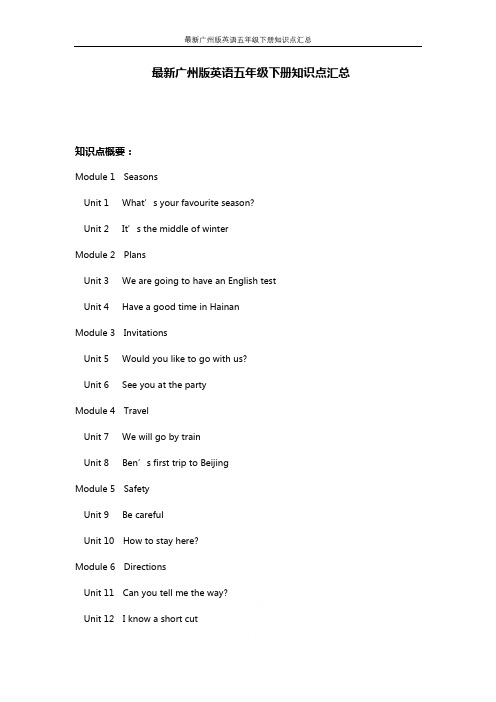
最新广州版英语五年级下册知识点汇总知识点概要:Module 1 SeasonsUnit 1 What’s your favourite season?Unit 2 It’s the middle of winterModule 2 PlansUnit 3 We are going to have an English testUnit 4 Have a good time in HainanModule 3 InvitationsUnit 5 Would you like to go with us?Unit 6 See you at the partyModule 4 TravelUnit 7 We will go by trainUnit 8 Ben’s first trip to BeijingModule 5 SafetyUnit 9 Be carefulUnit 10 How to stay here?Module 6 DirectionsUnit 11 Can you tell me the way?Unit 12 I know a short cut以下为详细内容▼Module 1 SeasonsUnit 1 What’s your favourite season?一、单词短语colourful 多彩的prefer 选择;宁愿winter 冬天either 也autumn 秋天ski 滑雪plant 种植;植物camp 野营;营地go camping 去野营go skiing 去滑雪plant flowers 种花play outdoor 在户外玩look at 看…… in the tree 在树上really love 确实喜欢like swimming 喜欢游泳go skiing 去滑雪make a snowman 堆雪人fly a kite 放风筝favourite season最喜欢的季节二、重点句型:1. --What’s your favourite season?--My favourite season is summer.2. –What season do you like best?--I like spring best.三、重点分析:1. in the tree 和on the tree都可以表示“在树上”;in the tree表示外来的东西在树上;on the tree表示树本身的东西。
广州版小学英语五年级下册英语重点知识点习题全册

Unit 1 What’s your favourite season?--Look at all the colourful flowers and the beautiful birds in the trees.--I really love spring. What’s your favourite season,Ben?--Summer. I love swimming and summer is the best time for swimming.--Do you like summer, Jiamin?--I like swimming but I don’t like summer. It is too hot. I prefer winter.--When it snows, I can make a snowman.--I don’t like summer and I don’t like winter, either.My favourite season is autumn. It’s very windy and I can fly a kite.看看这些五彩缤纷的花朵和树上美丽的小鸟。
我真的很喜欢春天。
本,你最喜欢什么季节?夏天。
我喜欢游并且夏天是游泳的最佳时间。
你喜欢夏天吗,家明?我喜欢游泳,但不喜欢夏天。
它太热了。
我更喜欢冬天。
下雪的时候,我可以堆雪人。
我不喜欢夏天,也不喜欢冬天。
我最喜欢的季节是秋天。
风很大,我可以放风筝。
一、重点短语:go skiing 去滑雪plant flowers 种花play outdoor 在户外玩look at 看……in the tree 在树上really love 确实喜欢like swimming 喜欢游泳go skiing 去滑雪make a snowman 堆雪人fly a kite 放风筝二、重点句型:1. --What’s your favourite season?--My favourite season is summer.2. –What season do you like best?--I like spring best.三、重点分析:1. in the tree 和on the tree都可以表示“在树上”;in the tree表示外来的东西在树上;on the tree表示树本身的东西。
广州版五年级英语下册1-12单元重点内容详解(复习资料)

辅导资料(广州版英语五年级下册)目录Unit 1 What’s your favourite season? (1)Unit 2 It’s the middle of winter (7)Unit 3 We are going to have an English test (12)Unit 4 Have a good time in Hainan (18)Unit 5 Would you like to go with us ? (28)Unit 6 See you at the party (33)Unit 7 We will go by train (38)Unit 8 Ben’s first trip to Beijing (46)Unit 9 Be careful (51)Unit 10 How to stay safe (56)Unit 11 Can you tell me the way? (61)Unit 12 I know a short cut (66)Unit 1 What’s your favourite season?一、重点短语:look at ... 看……the best time for... 最佳时机make a snowman 堆雪人fly a kite 放风筝go skiing 去滑雪go camping 去野营plant flowers 种花play outdoors 户外玩耍二、重点句型:1. --What’s your favourite season?--My favourite season is summer.2. --Which season do you like best?--I like spring best.3. --Do you like summer?-- Yes , I do./No, I don't.三、重点分析:【知识考点一】in the tree 和 on the tree的区别;相同之处:都可以表示在树上不同之处:in the tree表示在树上的东西,是外来的,比如人,鸟;on the tree表示在树上的东西,本是树的一部分,比如果实,花朵,叶子。
五年级下册英语素材期末复习提纲 广州版
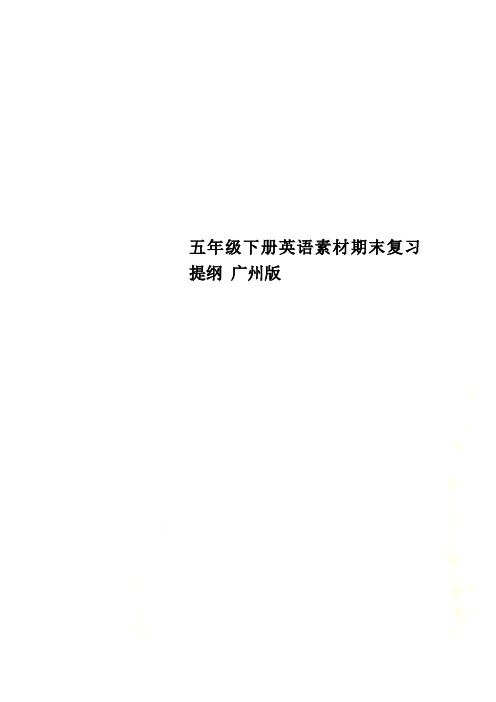
五年级下册英语素材期末复习提纲广州版6月1日其他重要的事情去他的家参加派对22) something important 23) have an English test 24) visit the museum 25) don’t forget某些重要的事情进行英语考试参观博物馆不要忘记26) have a sports meeting 27) next week 28) travel to Hainan 29) the next day举行运动会下一周到海南旅游第二天30) early in the morning 31) go mountain climbing 32) at noon 33) be sure一大早去爬山在正午确信34) can’t wait to…35) go for a picnic 36) play on the beach 37) all day迫不及待去野餐在沙滩上玩一整天38) camp under the stars 39) the school open day 40) travel for five days 41) fly there在星光下露营学校开放日旅游5天乘飞机去42) visit a farm 43) have a good time 44)sounds great 45) no problem参观农场过得愉快听起来很棒没问题46) next time 47) watch a football match 48) come together 49) have fun下一次看一场足球比赛聚在一起玩得开心50) a surprise party 51) see you at the party 52) plan to 53) go with us惊喜派对派对上见计划(去)和我们一起去54) at the school gate 55) meeting room 56) invite sb. to 57) special day在学校大门会议室要求某人去…特别的日子58) call me 59) go travelling 60) go by train 61) come back home打电话给我去旅游搭火车去回家62) Window of the World 63) first trip to…64) Happy Valley 65) take a walk世界之窗第一次去…欢乐谷散步66) drive to…67) Chinese clothes 68) take some photos 69) the Great Wall开车去…唐装拍照片长城70) the Summer Palace 71) the Wangfujing Street 72) go there on foot 73) around the lake颐和园王府井大街步行去那儿围绕着湖边74) go to Shenzhen 75) very exciting 76) by bus 77) by taxi去深圳非常兴奋搭车去去出租车去78) Tian’anmen79) be careful 80) dry the floor 81) fall down天安门小心弄干地板跌倒82) get hurt 83) cut yourself 84) get sick85) climb a tree受伤割伤自己生病爬树86) feed the animals 87) help sb. do sth. 88) cross the street 89) safety crossing给动物喂食帮助某人做某事横过街道安全通道90) leave the school 91) cross the road 92)traffic light 93) in trouble离开学校横穿马路交通灯遇上麻烦94) during school hours 95) strangers in the street 96) take money or candy from strangers在上学时间内街上的陌生人接受陌生人的钱或者糖果97) without +动ing 98) eat a bad apple 99) run on the stairs 100) touch a fan没有做…吃一个坏苹果在楼梯上跑碰风扇101) go straight ahead 102) on the left/right 103) be/get lost 104) next to…向前直走在左/右边迷路紧挨着…105) turn left/right 106) in ten minutes106) Don’t worry.107) get to向左/右转在10分钟内不要担心。
广州版小学英语五年级下每单元知识点

12.
have lunch
吃午饭
13.
help each other
互相帮助
14.
help sb. with sth.
帮某人做某事
15.
like you
像你一样
16.
need to dosth.
需要做某事
17.
other subjects
别的科目
18.
pen friend
笔友
19.
play the piano
大量的蔬菜
5.
at school
在学校
6.
feel hungry/ tired/ hot/ cold
觉得饿/累/冷/热
7.
for a long time
很长时间
8.
givesb.a check-up
给某人进行一次体检
9.
go to bed early
早睡
10.
hand in one’s homework
你们的新学校有更多的教师吗?
Yes,it does.
是的。
8.
Doesit have more classrooms in your new school?
你们的新学校有更多的教室吗?
No,it doesn’t.
不,没有。
9.
How manystudentsare therein your school?
一、单词
★better
更好的
★bright
光亮的
★hers
她的
★his
他的
★large
大的
★more
更多
★more than
最新广州版小学英语五年级下册知识点归纳.docx

广州版小学英语五年级下册知识点归纳Module 1Our Life一、1)能就“自己的日常生活”的话题进行交谈;2)能就“比较”的话题进行交谈;3)能用电话用语进行交流。
1、复习时态 ,特别要掌握好一般现在时第三人称作主语的特殊疑问句:1)How does he/she go to school.2)What time does he/she get up?3)Where does he/she study?4)Whose former pupil lives in Leeds?5)Which school does she study at?6)Who studies at Rose School?2、初步体验形容词比较级的句型:1)He is/looks thinner now than before.2)Is he taller than me?3)Does he look taller than me?4)He isn ’ t stronger than me.3、情态动词 should、 could、may 的用法及一些交际用语:1)He should get up early.2)She shouldn ’3)Could you help me? I ’ d be glad/love to.4)May I sit speak to Jane?5、电话用语 :--May I speak to Mr Li?--This is Ben speaking.注意问题1、总结主语是第三人称单数时 , 一般现在时的肯定句 ,否定句和一般疑问句的变化, 例如:I eat dinner at six.I don ’ t eat dinner at six. Do you eat dinner at six?He eats dinner at six too.He doesn ’ t eat dinner at six either. Does he eat dinner at six?2、总结主语是第三人称单数时, 一般现在时的特殊疑问句形式, 如:What time does he get up?He gets up at six.Where does she live?She lives in Renmin Road.How does he go to work?He goes to work by bus.Who hands in the homework?Jiamin does.Whose friend practices the piano?Jane’ s friend.Which school does she study at ?She studies at No. 2 School? 3. 当主语是第三人称单数时, 一般现在时的动词的变化的规律:1)一般情况加 -s,例如:visit –visits tell –tells work –works wave –waves 2) 以 s,x, sh, ch尾的 , 加-es,例如:wash –washes watch –watches catch –catches3)以音字母加 y 尾的 ,改 y i 加-es,例如:fly –flies study –studies4)部分以 o 尾的加 -es,例如: go –goes do –does5)特殊情况 have –hasUnit 11、for an hourfor 表示的度 ,例如: for two yearhalf an hour半小an hour and a half一个半小2、注意句型:Could you⋯?I ’ d be gladto. / I’ d love to.3、比句型:She is older than me.She is one year older than me.4、keep the rule守律;守Unit 21、用 :May / Could / Can I speak to⋯This is⋯speaking. / Speaking.Who’ s this / that?2、He looks thinner now than before. 他在看起来比以前瘦很多。
教科版(广州)英语五年级下册全册知识点归纳
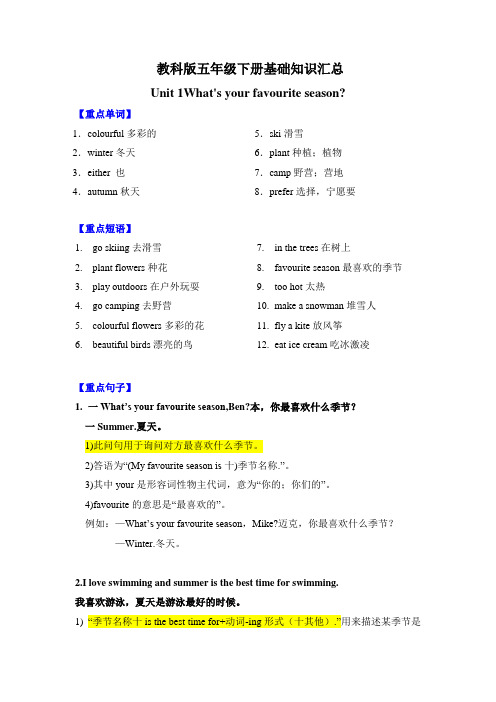
教科版五年级下册基础知识汇总Unit 1What's your favourite season?【重点单词】1.colourful多彩的2.winter冬天3.either 也4.autumn秋天5.ski滑雪6.plant种植;植物7.camp野营;营地8.prefer选择,宁愿要【重点短语】1.go skiing去滑雪2.plant flowers种花3.play outdoors在户外玩耍4.go camping去野营5.colourful flowers多彩的花6.beautiful birds漂亮的鸟7.in the trees在树上8.favourite season最喜欢的季节9.too hot太热10.make a snowman堆雪人11.fly a kite放风筝12.eat ice cream吃冰激凌【重点句子】1.一What’s your favourite season,Ben?本,你最喜欢什么季节?一Summer.夏天。
1)此问句用于询问对方最喜欢什么季节。
2)答语为“(My favourite season is十)季节名称.”。
3)其中your是形容词性物主代词,意为“你的;你们的”。
4)favourite的意思是“最喜欢的”。
例如:—What’s your favourite season,Mike?迈克,你最喜欢什么季节?—Winter.冬天。
2.I love swimming and summer is the best time for swimming.我喜欢游泳,夏天是游泳最好的时候。
1)“季节名称十is the best time for+动词-ing形式(十其他).”用来描述某季节是做某活动最好的时候。
2)其中best意为“最好的”。
3)for是介词,后接动词ing形式。
例如:Winter is the best time for skiing.冬天是滑雪最好的时候。
(完整版)广州版小学英语五年级(下)短语、句型汇总

2.---Wecango shopping, swim in the pool or play on the beach.我们可以去逛街、在池里游泳或者在海滩上玩。
3.---I can’t wait to see all the lovely deer.
我恨不得马上看到所有可爱的小鹿。
go by train乘火车去
on October 2nd在10月2日
visit Window of the World参观世界之窗
come back home回家
1.---How will you go there?你们打算怎样去那里?
---We will go by train. / By train.我们将乘火车去。/乘火车去。
see a film看电影
for a party为一个聚会
on June 11th在6月11日
anything else important其他重要的事情
an English test一次英语考试
visit the museum参观博物馆
the school openday学校开放日
visit a farm参观农场
为了到电影院,John常常是走出他们的房子后向左转。然后在第一个路口右转,一直往前走,并在第二路口向左转。
明天早上,他们将开车去长城。
in Wangfujing Street在王府进大街take a walk around the lake环湖散步
Module 5SafetyUnit 9Be careful!
fall down跌倒time to cook做饭的时间
eat a bad apple吃一个坏苹果be careful小心
广州版五年级的英语下册重要考点归纳.doc

speak+语言eg: speak english
say +内容eg: My mum says:“you should go to bed now”.
tell sb. sth.告诉某人某事(讲故事:tell a story)
talktalk about sth.谈论某事
6. tooto(+V原)太 以致不能
eg: It’s too cold to swim now.
7.What’s summer like in Australia澳大利的夏天怎么样(问天气)
What’slike怎么样
形容天气的形容词:
hot, cold, warm, cool, wet, dry, windy, sunny, snowy, rainy
too(用于肯定句)
放句末
“也”either(用于否定句)
also --------------------放句中
4. go skiing (去滑雪)go skating (去溜冰)
5. prefer更喜欢(用于两者之间做选择)
6. --What’s your favourite season你最喜欢的季节是什么
2. invite sb.to邀请某人去
3.all+可数名词复数:全部的(all her friends and classmates )
4.on this special day在这特殊的一天(on用于具体某一天)
5. call me on+电话号码(me代词放中间)
6. see you at the party聚会上见
rd
the +序数词+of+月份the 23rdof June(写法:June 23rd)
- 1、下载文档前请自行甄别文档内容的完整性,平台不提供额外的编辑、内容补充、找答案等附加服务。
- 2、"仅部分预览"的文档,不可在线预览部分如存在完整性等问题,可反馈申请退款(可完整预览的文档不适用该条件!)。
- 3、如文档侵犯您的权益,请联系客服反馈,我们会尽快为您处理(人工客服工作时间:9:00-18:30)。
五年级下册知识点Module 1 Our Life一、学习重点1)能就“自己的日常生活”的话题进行交谈;2)能就“比较”的话题进行交谈;3)能用电话用语进行交流。
1、复习时态,特别要掌握好一般现在时第三人称作主语的特殊疑问句:1) How does he/she go to school. 2) What time does he/she get up?3) Where does he/she study? 4) Whose former pupil lives in Leeds?5) Which school does she study at? 6) Who studies at Rose School?2、初步体验形容词比较级的句型:1) He is/looks thinner now than before. 2) Is he taller than me?3) Does he look taller than me? 4) He isn’t stronger than me.3、情态动词should、could、may的用法及一些交际用语:1) He should get up early. 2) She shouldn’t play computer game too much.3) Could you help me? I’d be glad/love to. 4) May I sit speak to Jane?5、电话用语:-- May I speak to Mr Li? -- This is Ben speaking.May / Could / Can I speak to …This is …speaking. / Speaking. Who’s this / that?注意问题1、总结主语是第三人称单数时, 一般现在时的肯定句,否定句和一般疑问句的变化, 例如:I eat dinner at six. He eats dinner at six too. I don’t eat dinner at six.He doesn’t eat dinner at six either. Do you eat dinner at six? Does he eat dinner at six?2、总结主语是第三人称单数时, 一般现在时的特殊疑问句形式, 如:What time does he get up? He gets up at six.Where does she live? She lives in Renmin Road.3. 当主语是第三人称单数时, 一般现在时的动词的变化的规律:1) 一般情况加-s,例如:visit –visits tell –tells work –works wave –waves2)以s, x, sh, ch结尾的动词, 加-es,例如:wash –washes watch –watches3) 以辅音字母加y结尾的动词,改y为i加-es,例如:fly –flies study –studies4) 部分以o结尾的动词加-es,例如:go –goes do –does5) 特殊情况have –hasUnit 11、for an hour for表示时间的长度,例如:for two year half an hour an hour and a half2、注意句型:Could you …? I’d be glad to. / I’d love to.3、比较级句型:She is older than me. She is one year older than me.4、keep the rule 守规律;守规则Unit 21、电话用语: May / Could / Can I speak to …This is …speaking. / Speaking. Who’s this / that?2、He looks thinner now than before. 他现在看起来比以前瘦很多。
look看起来3、短语:be worried about …担心be late for school 上学迟到hand in 交;递交on time / in time 依时;按时catch up with 赶上4. 比较:take (more) exercise have sportstake morning exercises take eye exercisesUnit 31、区别sleep / sleepy / asleepsleep v. 睡觉He is sleeping on his mother’s bed. 他睡在他妈妈的床上。
sleepy adj. 困的I’m sleepy. I want to go to bed. 我很困,我想睡觉。
asleep adj. 睡熟了He is fast asleep. 他很快睡觉。
2、祈使句的否定句:1.)Don’t be late for party. 参加聚会不要迟到。
2.)Don’t ask adults about ages. 不要文成年人关于他们的年龄。
3.)Don’t talk to others when there’s too much food in your mouth. 在满嘴是食物是不要根别人说话。
Module 2 Seeing a Doctor学习重点:能就“看病”的话题进行交谈。
1、看病用语:医生用语1) You should drink plenty of water. 2) You shouldn’t go to bed late.3) You’d better stay in bed. 4) Don’t eat too much chocolate.病人用语1) What’s the matter? 2) I feel ill/bad. 3) Take the medicine three times a day.4) I have a cold/headache/stomachache/toothache.2、生活用语:1) It’s time to get up. 2) I don’t want to be late for school.注意的问题:1、注意一些合成词的构成如:football chalkboard bedroom本模块出现的合成词:-achehead –headache tooth –toothache stomach –stomachache2、有情态动词should的句子的肯定式、否定式和一般疑问式:We should get there before eight. We shouldn’t (should not) get there too late.Should we get there before nine?Unit 41、It’s time to…与It’s time for…的区别:It’s time for bed /class/school/breakfast/lunch/dinner.(time后加名词)It’s time to go to bed/school/have breakfast/have lunch/have dinner. (time后加动词)2、联系动词fell / look / get/ become等后可以加形容词,例如:I feel tired / hot / cold / hungry. He looks tired / hungry / pale.Unit 51、What’s the matter? / What’s the matter with you?2、短语:give s.b. a checkup 给(某人)检查身体plenty of 大量的(可修饰可数或不可数名词)There is plenty of water. There are plenty of eggs in the basket.walk a lot 走很多路eat a lot 吃很多东西take the medicine three times a day 一天服药三次take long 花很多时间Never too much of good food. 好的东西也不能吃太多。
airsick 晕机backache 背疼earache 耳疼hurt 伤;疼得Module 3 Our School and Our Class一.学习重点1、能就“自己学校和班级”的话题进行交谈。
2、能就“比较建筑物”的话题进行交谈。
1、巩固形容词比较级和副词比较级的句型1) His school is better than mine. 2) My new school is much larger than the old one.3) Does the new school have more classroom than the old one? 4) She gets up earlier than us 2、情态动词would及must、need的否定式的用法及一些交际用语:1) You needn’t go to school by bus. 2) We mustn’t pick the flowers.3) Would you like to visit our new school? Yes, I’d love to.4) Welcome to our school. Thank you.注意的问题:1、比较两样(种)东西时形容词的变化形容词和副词的比较级:A.一般单音节和部分双音节的形容词的比较级在词末加-er:small –smaller new –newer old –older tall –taller weak –weakershort –shorter cheap –cheaper fresh –fresher clean -- cleaner; fast –faster B.以不发音的单音节和部分双音节的形容词的比较级,在词末加-r:nice –nicer fine –finer large –larger white –whiter late –laterC.以辅音字母加y的单音节和部分双音节的形容词的比较级把y改为i, 加er:easy –easier ugly –uglier heavy -- heavier friendly –friendlier hungry –hungrier tidy –tidier happy –happier pretty –prettier;sorry –sorrier early –earlierD.以单元音字母加一个辅音字母结尾的单音节形容词和副词双写最后一个字母加-er:big –bigger fat –fatter thin –thinnerE.部分单词属于不规则:good/well –better bad/badly –worse many –more例句:1) This dictionary is thinner than that one. 2) Is your shirt better than mine?3) Does our classroom look bigger than yours? 4) My mother always gets up earlier than me.2、代词的作用:例句:1) I often help him and he often help me too. 2) They like us and we like them too.3) My house is smaller than your house. Yours is larger than mine.4) Our pictures are better than their pictures. Ours pictures are better than theirs.3、still 与yetstill 用于肯定句和疑问句:He still works at Guangming Farm. Does she still study at that primary school?yet 用于否定句: They don’t start to work yet.4、有next, this, that的时间状语不需要加介词。
